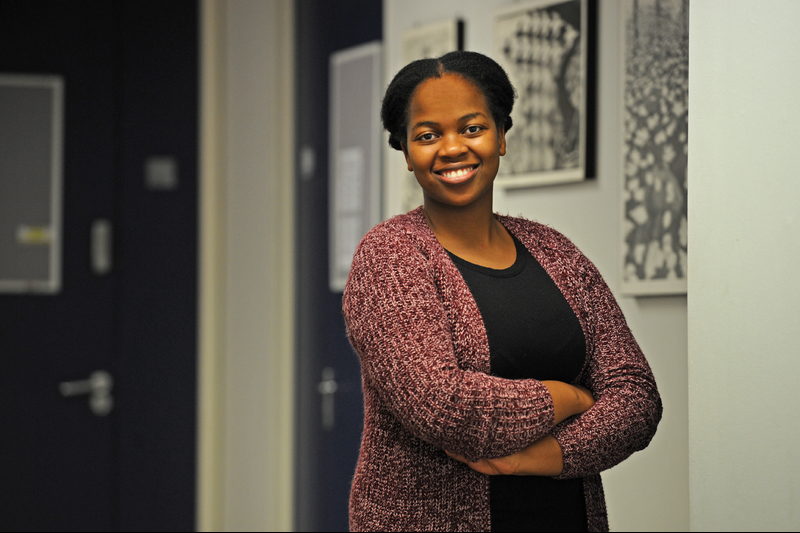A safe space to speak
08 May 2017 | Story Kate-Lyn Moore. Photo Michael Hammond.
When asked to imagine what her university years would have been like outside the Education Development Unit (EDU), teacher's assistant (TA) Lavhelesani Netshilindi is at a loss.
“When I try to picture it, I don't know,” she shakes her head.
“I don't think I would have survived.
“It is for people like me that have baggage,” she explains. More than the bags of clothes she brought with her to UCT. Language, financial stress and culture shock are but a few of the difficulties she experienced.
The EDU staff helped guide her through her struggles with English and worked with her to build up her confidence when speaking the language. They also counselled her through her financial stress, so that she could focus her energy on her studies.
Now, four years later and having recently passed part 1 of her qualifying examination, Netshilindi is well on her way to becoming a chartered accountant.
A space to transition
When she came to UCT, it was her first time away from her family and the small Limpopo village she calls home.
“It was actually quite scary, to be honest,” she says.
Added to this culture shock was the pressure she felt. She had the hopes of her entire village and high school behind her. Her small school had limited resources and generally produces one high-performing scholar per year according to Netshilindi.
“It is a lot of pressure,” she says. “When you have to study for a test and you are tired – you just think of everyone that you will need to call and say that you failed.”
Having no information about EDU before arriving, Netshilindi had registered for mainstream studies. She was already in the middle of orientation when she received a phone call from academic development officer Sherry Stuart and went to go and meet her.
After joining the EDU orientation, she immediately felt the difference: there was always someone asking if she was OK, or checking that she was coping.
This individual attention is one of the main characteristics of the EDU programme and there are a great many support structures in place, Netshilindi explains.
Knowing that she would not be able to learn in her home language, Tshivenda, was a major concern for her. Back in high school, if the learners didn't understand something in English, they would switch over to Tshivenda.
At UCT she describes the blank stares she sometimes received when someone didn't understand what she was saying. This discouraged her from speaking in front of classmates.
She recalls how she grew in confidence throughout the first-year EDU programme Step Up. First she discussed content one on one, then with a group of 16 or so classmates. Later she would speak in a class of 60 students. Why then not in front of 200?
You are speaking to me
Netshilindi's journey through EDU was filled with important and memorable moments. But it was a conversation she had with then EDU director Associate Professor June Pym when registering for her third year of study that carries the most significance.
“She could have just signed my form,” says Netshilindi. Instead, Pym took a long look at the marks in front of her and asked: How had she made such a jump between her first and second-year results?
“I looked at her and I started really crying. I said, 'It's just you. It's what EDU made me.' ”
Pym then encouraged her to become a tutor.
“Well, I can't speak English, so I can't tutor,” Netshilindi protested.
“You're speaking to me … Please just think about it,” Pym replied.
Pym's words of encouragement meant the world to Netshilindi. She remembers them whenever she is feeling unsure about taking on a new challenge. She became a tutor in her fourth year of study, then applied for her current job as a TA.
That is really why she is sitting here, she explains. Otherwise, she would almost certainly have gone straight into a corporate job.
Checking in
“Having someone to check on your programme means you have someone who cares enough to actually check,” says Netshilindi, of the monitoring and check-ins with academic development officers that are part of the EDU experience.
You are not going to be berated if you are failing, she explains. This is a compassionate environment to discuss and help solve your problems.
If you are struggling with a subject, they will pull in a senior student to provide additional tutoring. When she was asked to do this as an EDU alumnus, she was thrilled.
“So for me when I get an opportunity to help someone, it is just rewarding and fulfilling … Wow, this is someone who was in my same position and they just want help,” she says.
She hopes that other students will look to her, as someone who has been through the system, and know that it is possible to make it through successfully.
 This work is licensed under a Creative Commons Attribution-NoDerivatives 4.0 International License.
This work is licensed under a Creative Commons Attribution-NoDerivatives 4.0 International License.
Please view the republishing articles page for more information.










